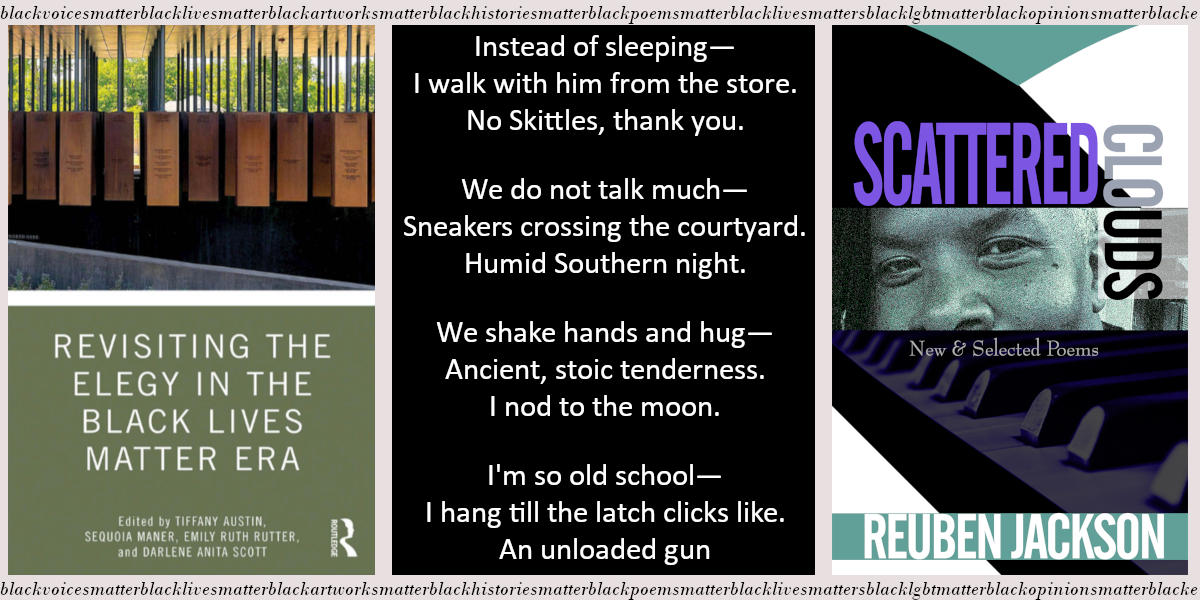The Ongoing Relevance of Reuben Jackson's "For Trayvon Martin"
The tragic death of Trayvon Martin is as relevant today as it was in 2012 as is Reuben's most anthologized poem "For Trayvon Martin."

In Reuben Jackson's reimagining of the night Trayvon Martin was murdered, Jackson cast himself as the boy's guardian angel, leading him home and out of harm's way.
Instead of sleeping—
I walk with him from the store.
No Skittles, thank you.
We do not talk much—
Sneakers crossing the courtyard.
Humid Southern night.
We shake hands and hug—
Ancient, stoic tenderness.
I nod to the moon.
I’m so old school—
I hang till the latch clicks like.
An unloaded gun.
There is no wonder why the poem is Jackson's most anthologized. In "For Trayvon Martin" Jackson speaks for every black and brown parent and mentor, their frustration and their love, when they must sit their child down and explain to them what to wear, where to walk, and how to interact with police.
Recently, "For Trayvon Martin" has been popping up in numerous places concerned with the BLACKLIVESMATTER movement. In Tiffany Austin, Sequoia Maner, Emily Ruth Rutter, and Darlene Anita Scott's new anthology Revisiting the Elegy in the Black Lives Matter Era, Jackson's poem receives a prominent place, as it does in a recent open letter by the Vermont Humanities Council director Christopher Kaufman Ilstrup. Ilstrup writes:
"Arguably, these killings of Black citizens have never stopped, and many scholars have written about the history of violence from Reconstruction to today. But the modern era of this violence might be pegged to the shooting death of Trayvon Martin in 2012 by “neighborhood watch” member George Zimmerman. Trayvon was just seventeen, walking home from the store with a bag of Skittles. One of our dear friends at Vermont Humanities, poet and scholar Reuben Jackson, wrote a poem at that time that still hangs with me today."
"For Trayvon Martin" is a subtle, heart-breaking kind of angry poem. This anger is all the more relevant now as we watch--and participate in-- it finally bubbling over. As I write this, historic crowds gather in city and country streets demanding a world where Jackson doesn't need to be there to walk Trayvon home.
"For Trayvon Martin" appeared in Jackson's debut collection fingering the keys which is reprinted in full in his new collection Scattered Clouds. Support Reuben and ASP by buying Scattered Clouds from our bookstore.
Alan Squire Publishing will also be making a donation to the National Bail Fund's Rapid Response Fund because:
BLACK VOICES MATTER
Here is a list of Bail funds worth supporting: https://www.communityjusticeexchange.org/nbfn-directory

Small Press Week 2018: Monday, a look back at the Inception of ASP
We’d been talking about founding a press for a few years. I was becoming increasingly frustrated and angry about what was happening to some of the books I’d edited, and to some of my writer friends. Some of the books I worked on already had committed publishers, who knew my work and wanted me involved, and that’s great. But sometimes I was hired by a writer who had a publisher but knew they were not going to give the book a thorough edit – there is less and less of that going on these days, as you can see from opening even a big-name title. And I think — we think — that that is awful. If you are published by ASP, you get a thorough and very fine edit…
Featured Audio: “The Lovesick Lake,” a Story by James J Patterson
“Lovers of the personal essay should be rejoicing in the streets at word of this collection. For readers and acquaintances of Jimmy Patterson, it is long overdue, but the author was born in Washington, D.C., where the machinery of progress is congenitally slow. So this book, in many important ways – is what all satisfying collections of autobiographical essays should be – a mirror of place.” Rick Walter
Armistice Day, known in the US as Veteran’s Day, is now a work week past, but for James J Patterson it is a memory and idea that refuses to restrain itself to a 24 hour period. Yesterday we published his moving account of those veterans of The Great War he knew growing up, memorializing and contextualizing them for an audience whose experience of the war may only be through the muddy, pained faces in old photographs…
The World of Yesterday (Armistice Day, 2018)
My father always said that his first memory was of standing on the couch in his parent’s living room, small hands on the back cushion, peering out a picture widow at a neighborhood street in Bend, Oregon. There is a slow-moving line of cars and horse-drawn carriages inching its way down the lane. The line of cars is there every day, and every day he stands there and watches. His street is a long one and at the end of it is the cemetery. He is not allowed to go outside to play. Death is all anyone talks about. Death from a great flu epidemic. Death from a great war just ending. Everyone has lost someone. Most have lost a few. It is 1918…